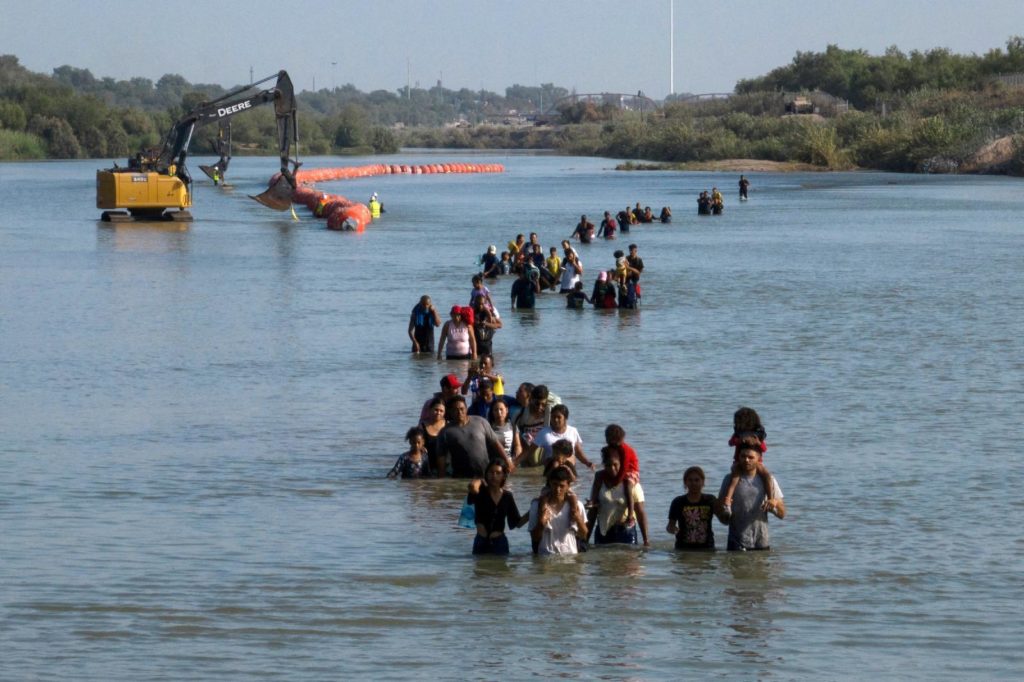A federal juge ordered Texas to remove controversial floating barriers in the Rio Grande and prohibited the state from adding or reinstalling additional buoys in the river aimed at reducing unauthorized border crossings, marking a legal victory for the Biden administration, which opposed their use.
The barriers were recently installed on the Rio Grande as part of Texas Republican Gov. Greg Abbott's latest attempts to stop migrants from crossing into the United States from Mexico under his "Operation Lone Star" program.
The U.S. Justice Department sued Texas in July arguing the buoys were installed unlawfully and should be removed. The lawsuit alleged the approximately 1,000-foot line of buoys, each 4 to 6 feet in diameter and strung together, also raised diplomatic, humanitarian and environmental concerns. The federal government further argued that Abbott violated federal law by deploying the barriers near Eagle Pass, Texas, without authorization from the U.S. Army Corps of Engineers, as the corps oversees all navigable waterways in the U.S.
In his preliminary injunction, U.S. District Judge David Alan Ezra for the Western District of Texas Austin Division ordered the state to remove the buoys by Sept. 15 at its own expense.
"Governor Abbott announced that he was not 'asking for permission' for Operation Lone Star, the anti-immigration program under which Texas constructed the floating barrier. Unfortunately for Texas, permission is exactly what federal law requires before installing obstructions in the nation's navigable waters," Ezra wrote.
Abbott's administration also is facing allegations of inhumane treatment of migrants seeking to cross the border into Texas with its "Operation Lone Star" program. A recent report alleged the state directed its personnel to withhold water from migrants despite extreme heat, and that state officials have set "traps" of razor wire-wrapped barrels in parts of the river, which in turn have increased the risk of migrants drowning by forcing them into deeper, more treacherous portions of the river.
A Sept. 6 statement attributed to the governor's office about the ruling said, "Texas will appeal."
"Today's court decision merely prolongs President Biden's willful refusal to acknowledge that Texas is rightfully stepping up to do the job that he should have been doing all along," the statement said. "This ruling is incorrect and will be overturned on appeal. We will continue to utilize every strategy to secure the border, including deploying Texas National Guard soldiers and Department of Public Safety troopers and installing strategic barriers. Our battle to defend Texas' sovereign authority to protect lives from the chaos caused by President Biden's open border policies has only begun. Texas is prepared to take this fight all the way to the U.S. Supreme Court."
The use of the buoys and other parts of the program including razor wire have been condemned by Catholic leaders, who called them inhumane. While Abbott is a practicing Catholic, and frequently cites his faith on policy positions such as protecting unborn children from abortion, his policies toward migrants and refugees have brought him into conflict with the state's Catholic bishops who have challenged them as incompatible with the church's teaching on the dignity of the human person and biblical mandates to welcome and care for strangers.
In an Aug. 31 post on X, formerly known as Twitter, Archbishop Gustavo García-Siller of San Antonio wrote that the "razor wire between US and Mexico is a barbaric practice, a cruel practice."
"There are other more human ways to engage with people," he wrote. "Lord have mercy of the hundreds injured and move the hearts of those who make these cruel decisions to change their ways. Lord have mercy!"

